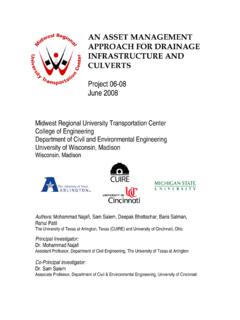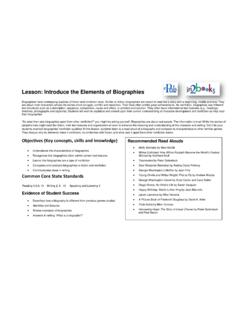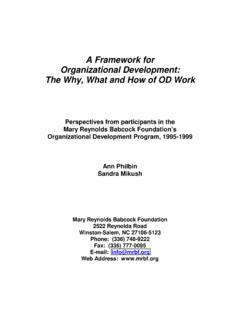Transcription of &ufd~/ - minds.wisconsin.edu
1 Parental Influence and Career Choice: How Parents Affect the Career Aspirations of Their Children by Kristen Anne Jungen A Research Paper Submitted in Partial Fulfillment of the Requirements for the Master of Science Degree In Guidance and Counseling Approved: 2 Semester Credits &ufd~/. Carol L. Jo on, The Graduate School University of Wisconsin-Stout May, 2008. 11. The Graduate School University of Wisconsin-Stout Menomonie, WI. Author: Jungen, Kristen Anne Title: Parental Influence and Career Choice: How Parents Affect the Career Aspirations of Their Children. Graduate Degree/ Major: MS Guidance and Counseling Research Adviser: Carol L. Johnson, MonthlYear: May, 2008. Number of Pages: 36. Style Manual Used: American Psychological Association, 5th edition ABSTRACT. While perception suggests career choice is an individual decision, research indicates a variety of influences are likely to determine ones ultimate career choice.
2 Parents have been found to greatly impact the career selection process of their children. Many parents are unaware of all the ways they can influence their children's career decision. Work ethic, family values and gender stereotyping in the family may have greater impact than previously thought. This literature review dispels the myth that children and adolescents defy their parents' values and expectations regarding career options. III. The Graduate School University of Wisconsin Stout Menomonie, WI. Acknowledgments I would like to thank Dr. Amy Gillett for her helpful writing strategies during the Research Foundations class. Dr. Gillett is a great asset to this university, and I applaud her for her unique ability to make the impossible seem possible. I would also like to thank Jana Reeg-Steidinger at the UW-Stout library for helping me locate useful research. In addition, I want to thank my thesis advisor, Dr. Carol Johnson, for her dedication throughout the editing process.
3 It was Carol's class of Career Development Theory that inspired me to research this topic, and I am so pleased that she was willing to be my advisor. In addition to the UW-Stout faculty, I would like to thank my fiance Henry for his love and patience throughout my graduate studies. His willingness to listen and offer encouragement made all the difference. Finally, I want to thank my mother and father for their love and support throughout graduate school and my entire life thus far. Their values and work ethic made me who I am today. I couldn't have done this without them. iv TABLE OF CONTENTS.. Page ABSTRACT ii Chapter I: Introduction 1. Statement ofthe Problem 4. Objectives 4. Definition ofTerms 4. Assumptions and Limitations 5. Chapter II: Literature Review 6. Theories ofChildren 's Career Aspirations 6. Parental Values and Expectations 10. The Parent-Child Relationship 13. Gender Socialization 16. A Mother's Influence 18.
4 Take Our Daughters And Sons To Work Program 20. Chapter III: Summary, Critical Analysis, and Recommendations 24. Summary and Critical Analysis ofthe Literature Review 24. Recommendations for Further Research 26. Recommendations for School Counselors 27. References 29. Chapter I: Introduction Choosing a career is often considered a major turning point in a young adult's life. This decision alone has the potential to open the door for success or close the door of opportunity. While often perceived to be an individual choice, research suggests that a variety of influences such as family, school, community, and social and economic factors are likely to manipulate one's ultimate career decision (Ferry, 2006). Among these factors, students report that parents have the greatest influence on which career they choose (Kniveton, 2004). Few parents seem to recognize this impact and still believe that they have little to do with the career choices of their children (Taylor, Harris, & Taylor, 2004).
5 In a study from the University of North Carolina-Chapel Hill (Taylor, Harris, & Taylor, 2004), almost half of freshman parents stated that they believed they should remain neutral in regard to their child's career development. However, additional studies show that parents have a greater influence than teachers on career choice (Kniveton, 2004) and can even influence what major their children choose to pursue in college (Simpson, 2003). It is clear that parents believe they have less influence over their children's career decisions than the research supports. This perception seems to differ from the perception of children, who often report their parents to be of the highest influence (Ferry, 2006;. Kniveton, 2004). Due to this perception gap, it is important to examine the result of parental influence in regard to their children's career choices. While parents assume that their direct career advice may be influential, they may be unaware that they can also exert a strong career influence simply by serving as examples of workers (Kniveton, 2004).
6 In fact, children as young as five years old begin 2. to identify with the occupation oftheir mother or father (Havighurst, 1964). Parents start influencing career decisions as soon as their children can pronounce their job title. Parents may also be unaware of the impact their norms and values have on their child's career choice. According to Biddle, Bank, and Marlin (as cited in Simpson, 2003), "rather than responding directly to external pressures .. students internalize parental norms and preferences and act, therefore, in accordance with those norms". (Transmission of Values section, ~ 1). Because parental norms and values are likely to affect career choice, it is important that parents understand the subtle ways that they communicate their norms and values on a regular basis. Research shows that parental norms and values most often affect children's career aspirations via parental interactions (Lavine, 1982), involvement in schoolwork (Simpson, 2003), and gender expectations (Jacobs, Chhin & Bleeker, 2006; Hesse-Biber & carter , 2000).
7 While parents may assume other variables such as occupation or education to be most influential, their influence is most often exerted through normative channels including their interest in schoolwork and aspirations for educational achievement (Simpson, 2003). Many adults underestimate their children's intuitive capabilities (Jacobsen, 1999). Poulter (2006) states that, "Children have a nonstop camera running in their mind, recording any and all behaviors, comments, and attitudes of their parents" (p. 174). For instance, children's career preference can be influenced by regularly witnessing gender . typed interactions in the home (Lavine, 1982). This might include the portrayal of a dominant or non-dominant parental role that conveys a message to children about their own role in society. While parents may not consider this to be influential at a young age, 3. these interactions can profoundly limit or expand their children's future career aspirations.
8 In addition to becoming aware of the norms and values they portray, parents also need to know that their children will likely adopt these norms and values as their own. Michael Rutter (as cited in Otto, 2000) stated that, "Young people tend .. to share their parents' values on the major issues oflife .. " (p. 111). Similarly, Otto (2000) said that ninety-three percent of high school juniors in his study reported holding similar values to their parents. This is significant because it dispels the myth that children and adolescents tend to defy their parents' values and expectations. Instead, it may be more accurate to say that children are quick to adopt their parent's norms and values, perhaps without ever exploring their own. This may be due to children's natural desire to connect with their parents (Poulter, 2006). As a result, they seek acceptance by adopting parental values and living out their career aspirations. Jacobsen (1999) referred to this phenomenon as "hand.
9 Me-down dreams," which is the title of her book about parental influence. The danger in these quick assumptions is that children may aspire to a career that follows their parents' norms and values without developing their own sense of self. Jacobsen (1999) pointed out the following wager: "If your family's values mesh with your own, you can find strength and guidance in them throughout your career, however, if these values don't mesh, you'll build a career that your parents take pride in, but that leaves you frustrated and empty" (Jacobsen, 1999, p. 101). For that reason, it is important for parents to understand the many ways that they can influence their children's career choice. 4. Statement ofthe Problem This paper is a literature review about parental influence on their children's career aspirations. This topic was chosen to further explore knowledge regarding adolescent career choice and the role that parents play in this decision.
10 This is an important topic because parents may not realize the major impact their norms, values and gender roles have on career choice. Parental influence may present opportunities or obstacles during career exploration. Therefore, the question is how do parents affect the career aspirations of their children? Literature was reviewed and summarized during the spring of 2008. Objectives There are four objectives this paper will address. They are: 1. To examine parental influence within four theories of career development. 2. To gather research showing a link between parental expectations and children's career decisions. 3. To investigate gender socialization within the home and its affects on children's career perceptions. 4. To provide insight about parent-child relationships and how this may influence children's career aspirations. Definition ofTerms In this paper, the following terms will be defined for the sake of clarity and understanding.







